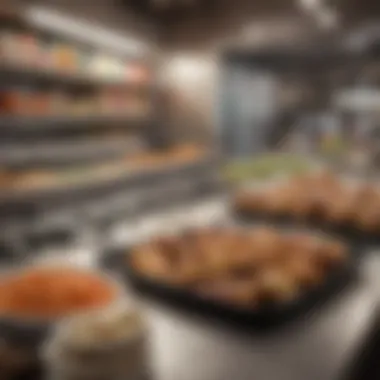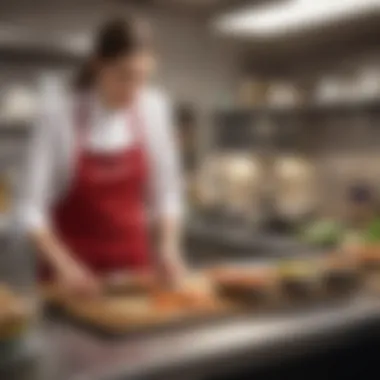Top Cooking Stores for Culinary Enthusiasts


Intro
The culinary landscape today is an intricate tapestry woven from the experiences of home cooks, food enthusiasts, and professional chefs. As individuals embark on their culinary journeys, the right cooking tools and ingredients can significantly impact their success. This guide takes a detailed look at leading cooking stores, both brick-and-mortar and online, showcasing how these establishments serve as valuable resources for every level of cooking expertise.
Understanding the needs of various culinary enthusiasts is crucial. While novices often seek basic utensils and essential ingredients, seasoned chefs may look for specialized tools and gourmet options. This examination delves into the distinct offerings of prominent cooking stores, providing insights that cater to the preferences of a diverse audience.
It is essential to assess both the tangible products available and the customer service aspects that contribute to a satisfying shopping experience. The strengths and weaknesses of each store are evaluated, equipping readers with the knowledge needed to make informed choices for their culinary endeavors.
Foreword to Cooking Stores
Cooking stores play a crucial role in the culinary landscape, serving as not just retailers but also as community hubs for cooking enthusiasts. The diverse range of products they offer meets the varying needs of both beginners and seasoned chefs. In this article, we will explore the essential functions of cooking stores and how they significantly contribute to the culinary arts.
The importance of cooking stores cannot be underestimated. They provide access to tools that can elevate home cooking experiences, ensuring that both quality and variety are present. From high-end knives to baking supplies, the right equipment can facilitate creativity in the kitchen. Furthermore, cooking stores often serve as educational resources, offering workshops, demonstrations, and expert advice. This creates an environment where culinary skills can flourish, making them invaluable for aspiring chefs.
The Role of Cooking Stores in Culinary Arts
Cooking stores serve multiple functions within the culinary arts. Firstly, they offer a variety of products essential for various cooking techniques. Whether one is looking for specialized cookware or unique spices, cooking stores often have a broad selection. These products can inspire new recipes and techniques, pushing home cooks to experiment.
In addition to being retail spaces, many cooking stores function as learning centers. They often provide classes or tastings, allowing customers to gain hands-on experience and new skills. These opportunities not only enrich the culinary knowledge of individuals but also foster a sense of community among participants.
Moreover, cooking stores often showcase local brands and products, helping to elevate regional culinary cultures. By supporting local artisans, these stores become conduits for preserving culinary heritage, which is essential in broader conversations about food sustainability and ethics.
Identifying Quality Providers
Finding a reputable cooking store is pivotal for enhancing one’s culinary journey. Quality providers stand out in several ways. First and foremost, they curate their product selection meticulously. This means prioritizing brands known for durability and performance. When a store carries items like Calphalon cookware or Wüsthof knives, customers can feel assured of the quality.
Another indicator of a quality cooking store is knowledgeable staff. Employees who understand culinary products can provide invaluable recommendations. Their guidance can help customers select items that truly fit their needs, whether it’s suggesting the right baking pan for a sourdough recipe or a knife that feels comfortable for a novice.
Furthermore, quality providers often extend customer service beyond the initial purchase. This includes after-sales support such as return policies, warranties, and repair services. An establishment that offers these services demonstrates a commitment to customer satisfaction, thus building a loyal customer base.
To summarize, cooking stores are essential for culinary enthusiasts of various skill levels. They provide not just products, but also education and community support. Identifying quality providers ensures that customers receive the best possible experience, enhancing their passion for cooking.
Physical Cooking Stores
Physical cooking stores play a crucial role in the culinary landscape, providing a tangible shopping experience that online retailers cannot fully replicate. The ability to touch, feel, and examine products directly enhances the shopping experience for both amateur cooks and seasoned chefs. It allows customers to evaluate the quality of cookware, taste unique ingredients, and consult knowledgeable staff for tailored advice. These elements foster a deeper connection to the culinary arts, elevating the purchase process from a mere transaction to an engaging encounter with the products themselves.
In this section, we will examine three types of physical cooking stores: specialized culinary shops, major retail chains, and local artisan stores. Each offers distinct advantages and considerations that contribute to their significance in the market.
Specialized Culinary Shops
Specialized culinary shops are dedicated to particular areas of cooking or types of cuisine. These stores often provide high-end tools, unique gadgets, and specialty ingredients that are not readily available in more conventional shops. A chef looking for a Japanese knife, for example, can find exactly what is needed in a store focused solely on Asian culinary tools.
Moreover, these shops frequently host cooking classes or demonstrations. This creates an opportunity for customers to learn from experts while exploring new products. Visiting a specialized shop can also foster the discovery of items that might not otherwise be considered in a typical shopping scenario.
Major Retail Chains
Major retail chains such as Williams-Sonoma and Bed Bath & Beyond offer a wide range of cooking supplies. The advantage of shopping at these stores includes the combination of affordability and diversity. They stock a variety of brands and product types, making it easier for consumers to find items that fit their specific needs without straining their budgets.
These chains usually have dedicated sections for seasonal items, gadgets, and staple cookware. However, while they provide convenience and accessibility, sometimes the customer service may lack the personalized touch found in smaller shops. Shoppers might find it challenging to get specialized advice, given the volume of customers these stores attract.


Local Artisan Stores
Local artisan stores represent the heart of community-driven culinary resources. Often family-owned, these shops curate a selection of locally produced goods. They might offer handmade kitchen tools, organic ingredients, or specialty products from nearby farms. Shopping at these stores supports local economies and promotes sustainable practices.
Such an environment encourages relationships between customers and shop owners. This connection often leads to valuable insights about product origins, methods of use, and exciting recipes tailored to local ingredients.
Online Cooking Stores
Online cooking stores have risen to prominence in recent years. Their relevance lies in the convenience and vast selection they offer consumers. Shoppers can explore a world of culinary products without leaving the comfort of their homes. These platforms cater to various needs, making shopping accessible for everyone, from hobbyists to seasoned chefs. The myriad options provided can accommodate a wide range of budgets and preferences.
E-commerce Giants
E-commerce giants like Amazon and Walmart dominate the online culinary landscape. They provide an extensive array of cooking products, often boasting competitive prices due to their scale. The selection available ranges from cookware to small appliances and pantry essentials. Customers frequently benefit from customer reviews, which can guide purchasing decisions. Additionally, their return policies are generally customer-friendly, fostering a sense of trust and reliability.
Key Characteristics of E-commerce Giants:
- Large product ranges across multiple categories
- Competitive pricing and frequent discounts
- Extensive customer reviews for informed purchasing
- Easy return processes for online orders
Niche Online Retailers
Niche online retailers, such as Sur La Table and Williams Sonoma, focus on specialized culinary products. These stores often carry higher quality or unique items not found in larger retailers. They curate selections to cater to specific culinary interests, like baking or gourmet cooking. Often, they provide expert advice through blogs or recipe suggestions, enhancing the customer experience.
Advantages of Niche Online Retailers:
- Tailored product offerings with a focus on quality
- Expert advice and community engagement through content
- Unique products that appeal to specific culinary interests
Subscription Box Services
Subscription box services, including Hello Fresh and Blue Apron, have transformed how people engage with cooking. These services deliver a curated selection of ingredients and recipes straight to the door. They allow users to explore new flavors and cooking techniques without the need to plan meals in advance. The subscription model makes it easier for consumers to try new recipes without significant up-front investment in diverse ingredients.
Benefits of Subscription Box Services:
- Convenience through pre-measured ingredients and recipes
- Opportunities to try new cuisines with minimal commitment
- Helpful for individuals seeking a structured cooking approach
"Online cooking stores not only provide convenience but also expand the culinary horizons of users by offering products that may not be locally available."
In summary, online cooking stores play a critical role in modern culinary practices. They facilitate access to an extensive range of products, provide user-friendly experiences, and foster a love for cooking among diverse audiences.
Essential Categories of Cooking Products
In the landscape of culinary arts, understanding the various categories of cooking products is vital for both enthusiasts and professionals alike. Each category serves distinct purposes, contributing to the overall success of the cooking process. By recognizing these essentials, individuals can make informed choices that enhance their culinary experiences.
Cookware and Bakeware
Cookware and bakeware form the backbone of any kitchen. They are necessary for preparing meals, from simple stir-fries to elaborate baked goods. Cookware typically includes pots, pans, and skillets, while bakeware consists of items like baking sheets, loaf pans, and muffin tins.
Choosing the right materials is crucial. Options include stainless steel for durability, cast iron for heat retention, and non-stick surfaces for easy release of food. While non-stick cookware simplifies cooking and cleaning, it is essential to avoid overheating, which can damage the coating.
More so, having a diverse range of cookware can elevate a dish's quality. For instance, using a heavy-duty Dutch oven can add depth of flavor when braising meats. Furthermore, proper maintenance can extend the life of these items, ensuring they remain reliable tools in one’s culinary arsenal.
Utensils and Gadgets


Utensils and gadgets may seem minor, but they play an important role in the cooking process. Utensils include spatulas, whisks, and measuring cups, while gadgets range from peelers to food processors. Even the most well-stocked kitchen might lack a few essential tools, affecting efficiency.
Investing in high-quality utensils enhances both comfort and precision while cooking. For example, a well-balanced chef’s knife improves slicing and chopping, reducing preparation time. Moreover, gadgets like immersion blenders offer convenience for tasks that traditionally require more complex setups, like pureeing soups.
Simple tools such as microplane graters or zesters can add depth to dishes by enhancing flavors through the use of citrus or spices. Therefore, having the right utensils and gadgets can make a substantial difference in culinary creativity and expression.
Ingredients and Pantry Items
The final category focuses on ingredients and pantry items, which are the essence of any recipe. A well-stocked pantry can inspire creativity and improvisation, allowing cooks to prepare meals with minimal planning.
Key items to consider include grains, oils, spices, and canned goods. Quality ingredients can greatly influence the flavor profile of a dish. For instance, using high-quality olive oil instead of a cheaper alternative can significantly impact the taste of pasta dishes. Likewise, fresh herbs can elevate a meal's aroma and taste.
Moreover, keeping a diverse selection of spices can encourage experimentation with different cuisines. Ingredients like coconut milk, lentils, or specialty flours can also introduce new elements to your cooking repertoire.
In sum, the categories of cooking products are interconnected, each playing a unique role in the culinary journey. Understanding their importance can lead to smarter purchases and better cooking outcomes.
Evaluating Customer Service
Customer service is a critical aspect when it comes to cooking stores. It greatly shapes the shopping experience for customers, whether they are buying in a physical store or online. Quality customer service can enhance customer satisfaction, ensure loyalty, and ultimately lead to repeat purchases. Indeed, evaluating customer service involves several specific elements that are vital to understanding the strengths and weaknesses of various cooking stores.
In-Store Experience
In-store experience is the first touchpoint for many customers. The atmosphere, layout, and overall design of the cooking store can influence a shopper’s decision to purchase. Friendly and knowledgeable staff play a pivotal role in this environment. Shoppers often seek guidance on products, whether it's cookware, utensils, or specialty ingredients. Therefore, the ability to ask questions and receive helpful advice significantly enhances the in-store experience.
A well-organized store is also essential. Products should be easy to find, and categories should be clearly marked. Moreover, having demonstrations or sampling stations can elevate the shopping experience. These opportunities allow potential buyers to interact with products before committing to a purchase.
Online Shopping Experience
For many, online shopping offers convenience that physical stores cannot match. The ease of browsing through an extensive range of cooking products is a major benefit. Here, customer service must translate into user experience through website design, navigation, and accessibility.
Live chat support can be valuable, allowing users to ask questions quickly about products. Detailed product descriptions and customer reviews are crucial as they inform purchasing decisions. Additionally, the checkout process needs to be seamless to prevent cart abandonment. A solid online return policy is also a key factor that affects consumer trust in an online store.
After-Sales Support
After-sales support is often overlooked but is an integral part of evaluating customer service. This stage covers how well a cooking store handles potential complaints or issues post-purchase. Customers may require assistance with product usage or might need to process returns or exchanges.
Good after-sales support can include easy return processes, readily available customer service representatives, and follow-up communications to ensure customer satisfaction. This not only resolves immediate concerns but also fosters a sense of trust and connection with the brand.
"Investing in customer service is investing in customer loyalty."
All these dimensions of customer service—whether in-store, online, or in after-sales support—are vital elements that should be assessed when evaluating a cooking store. They directly impact the overall shopping experience and shape a customer’s perception of the brand.
Price Considerations
Understanding price considerations is essential when selecting a cooking store. The financial element impacts not only how much you spend but also the quality and range of products available to you. Balancing cost with value is vital for anyone engaged in cooking, whether for pleasure or professional purposes. Choosing appropriately can lead to substantial savings and better resource allocation down the line.
Price points can vary widely among cooking stores. Factors such as location, brand reputation, and the type of products offered all contribute to this variability. Thus, it's crucial for consumers to evaluate what aligns with their budget while still fulfilling their specific culinary requirements. People tend to overlook costs that can accumulate over time, such as maintenance or replacement of kitchen items.
Budget-Friendly Options
For those on a tight budget, exploring budget-friendly options is a wise choice. Many stores offer reasonably priced cookware and utensils without sacrificing essential quality. Retailers like IKEA, Walmart, and Target provide various cooking tools and equipment; all at competitive prices. These stores might not have the most premium items, but they often have solid foundational products suited for novice cooks or home chefs.


Moreover, shopping during sales seasons or using discount codes can lead to significant savings. Here are some considerations regarding budget-friendly shopping:
- Look for clearance sections to find discounts.
- Check online retailers for special offers.
- Consider purchasing second-hand items through platforms like Facebook Marketplace or Reddit.
Premium Brands
On the other hand, premium brands offer specialized products that deliver exceptional quality and performance. Brands such as Le Creuset, All-Clad, and KitchenAid stand out for their durability and functionality. While the price point is generally high, many chefs and cooking enthusiasts find frequent use of these products justifies the investment.
When selecting premium options, buyers should focus on specific items that can serve multifarious functions.
- High-quality pots and pans can last for decades.
- Stand mixers are invaluable for extensive baking needs.
- Quality knives enhance both safety and food preparation speed.
Sustainability and Ethical Sourcing
Sustainability and ethical sourcing are crucial themes in the current culinary landscape, influencing the choices made by both consumers and retailers. The growing awareness of environmental issues has led many culinary enthusiasts to seek products that are not only functional but also support environmentally responsible practices. This trend reflects an increasing demand for transparency about how products are made and sourced. In the realm of cooking stores, this focus on sustainability serves several key benefits:
- Environmental Protection: Sustainable practices can significantly reduce waste and pollution.
- Social Responsibility: Ethical sourcing often means supporting fair labor practices.
- Quality Assurance: Products made with sustainable methods can often be of higher quality, as they tend to use more natural ingredients and materials.
For cooking stores, integrating sustainability into their business model is not merely a trend but a necessity in meeting consumer demands and contributing positively to the environment.
Eco-Friendly Practices
Cooking stores that prioritize eco-friendly practices embrace a variety of initiatives. These can include:
- Sustainable Packaging: Using biodegradable or recyclable materials to reduce landfill waste.
- Energy-Efficient Operations: Implementing energy-saving measures in their stores to lower carbon footprints.
- Product Selection: Offering items that are made from sustainable materials, such as bamboo utensils or cookware with non-toxic coatings.
By choosing to incorporate these eco-friendly practices, cooking stores not only enhance their brand image but also attract customers who are conscious of their environmental impact. This is increasingly important as chefs and home cooks alike look for ways to minimize waste and choose responsible brands.
Supporting Local Producers
Supporting local producers is another important element of ethical sourcing. Cooking stores that prioritize local products foster community relationships and promote regional economies. Local sourcing offers several advantages:
- Fresher Ingredients: Local products often come directly from nearby farms and producers, ensuring freshness and quality.
- Reduced Carbon Footprint: Shortening the supply chain minimizes transportation emissions, making it a more sustainable choice.
- Community Engagement: Buying from local producers strengthens local economies and supports farmers and artisans.
Incorporating local products into their inventory allows cooking stores to create a unique selection that differentiates them from larger chains.
Ethical sourcing is not just beneficial for the environment; it also encourages a healthier community and fosters a deeper connection between consumers and their food sources.
Culmination
In the realm of culinary arts, the importance of selecting the right cooking store cannot be overstated. A reliable cooking store shapes the cooking experience, whether one is an experienced chef or a novice in the kitchen. This article has delved into various aspects of cooking stores, illuminating their diverse offerings, customer service, and price considerations.
Choosing the right cooking store enables culinary enthusiasts to access quality products that meet their needs and preferences. Shoppers must consider factors like product range, the reputation of the store, and overall shopping experience.
When deciding where to shop, consumers should think about their specific requirements, from basic items for everyday cooking to specialized tools for gourmet meals. The blend of physical and online stores provides advantages, such as immediate product access or the convenience of home delivery.
Additionally, understanding the values of a store can greatly influence satisfaction. Many cooking stores now emphasize sustainability, offering eco-friendly products or supporting local artisans. This not only enhances customer loyalty but positively impacts the environment.
Ultimately, smart shopping decisions stem from evaluating various stores and understanding what each has to offer. This will equip every cook, regardless of skill level, with the tools they need to thrive in the kitchen.
Choosing the Right Cooking Store
To choose the right cooking store, start with a clear understanding of what you need. Have a list of items in mind, from cookware to specialty ingredients. Consider both physical and online options, as each has unique benefits.
- Research Store Reputation: Look for reviews on platforms like Reddit and Facebook to gauge customer satisfaction.
- Check Product Range: Ensure the store carries items pertinent to your culinary ventures.
- Evaluate Customer Service: A knowledgeable staff can enhance the shopping experience. Speak with employees if you're in a physical store or read the customer service policies for online shops.
- Consider Sustainability: If values are important to you, search for stores that promote eco-friendly practices.
In concluding, your choice of a cooking store can profoundly influence your culinary journey. Finding the right fit helps develop skills and enhances satisfaction in the kitchen.







